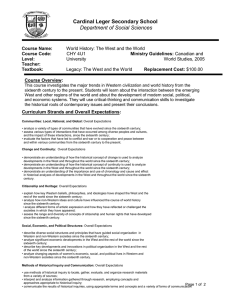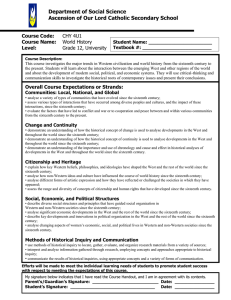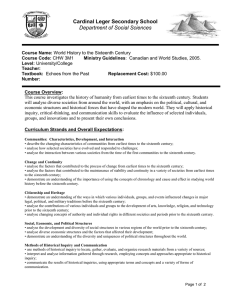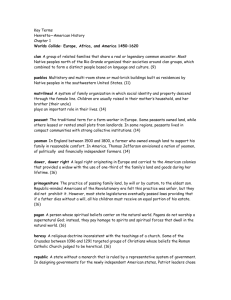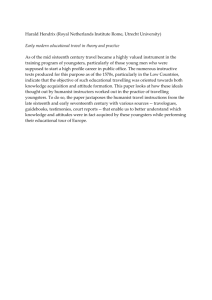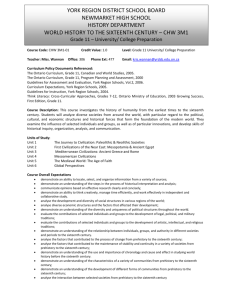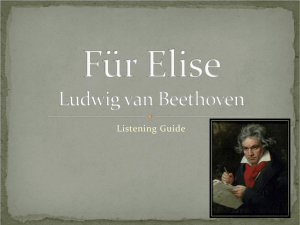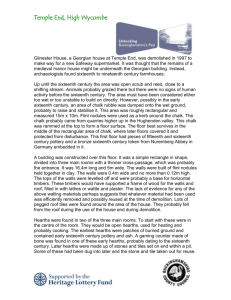Cardinal Leger Secondary School Department of Social Sciences Course Name:
advertisement
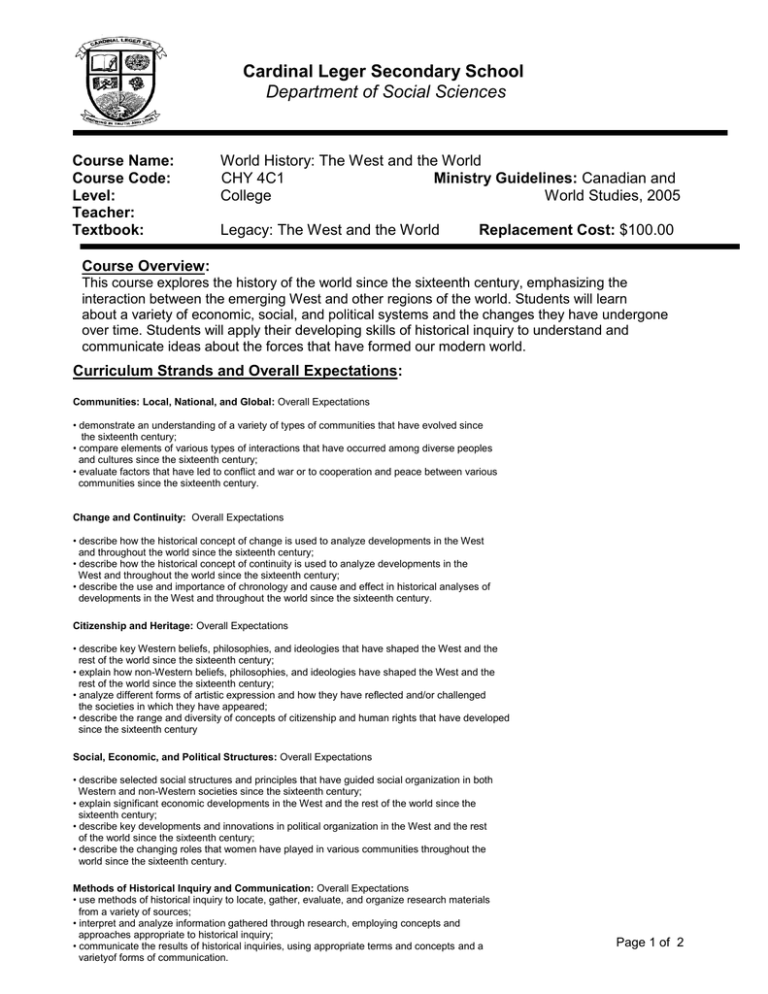
Cardinal Leger Secondary School Department of Social Sciences Course Name: Course Code: Level: Teacher: Textbook: World History: The West and the World CHY 4C1 Ministry Guidelines: Canadian and College World Studies, 2005 Legacy: The West and the World Replacement Cost: $100.00 Course Overview: This course explores the history of the world since the sixteenth century, emphasizing the interaction between the emerging West and other regions of the world. Students will learn about a variety of economic, social, and political systems and the changes they have undergone over time. Students will apply their developing skills of historical inquiry to understand and communicate ideas about the forces that have formed our modern world. Curriculum Strands and Overall Expectations: Communities: Local, National, and Global: Overall Expectations • demonstrate an understanding of a variety of types of communities that have evolved since the sixteenth century; • compare elements of various types of interactions that have occurred among diverse peoples and cultures since the sixteenth century; • evaluate factors that have led to conflict and war or to cooperation and peace between various communities since the sixteenth century. Change and Continuity: Overall Expectations • describe how the historical concept of change is used to analyze developments in the West and throughout the world since the sixteenth century; • describe how the historical concept of continuity is used to analyze developments in the West and throughout the world since the sixteenth century; • describe the use and importance of chronology and cause and effect in historical analyses of developments in the West and throughout the world since the sixteenth century. Citizenship and Heritage: Overall Expectations • describe key Western beliefs, philosophies, and ideologies that have shaped the West and the rest of the world since the sixteenth century; • explain how non-Western beliefs, philosophies, and ideologies have shaped the West and the rest of the world since the sixteenth century; • analyze different forms of artistic expression and how they have reflected and/or challenged the societies in which they have appeared; • describe the range and diversity of concepts of citizenship and human rights that have developed since the sixteenth century Social, Economic, and Political Structures: Overall Expectations • describe selected social structures and principles that have guided social organization in both Western and non-Western societies since the sixteenth century; • explain significant economic developments in the West and the rest of the world since the sixteenth century; • describe key developments and innovations in political organization in the West and the rest of the world since the sixteenth century; • describe the changing roles that women have played in various communities throughout the world since the sixteenth century. Methods of Historical Inquiry and Communication: Overall Expectations • use methods of historical inquiry to locate, gather, evaluate, and organize research materials from a variety of sources; • interpret and analyze information gathered through research, employing concepts and approaches appropriate to historical inquiry; • communicate the results of historical inquiries, using appropriate terms and concepts and a varietyof forms of communication. Page 1 of 2 Cardinal Leger Secondary School Department of Social Sciences Assessment and Evaluation Term Work (Formative Assessment) 70% Knowledge and Understanding 25% Thinking 25% Communication 25% Application 25% Summative Assessment 30% Formal Examination 20% Culminating Performance Task 10% Course Total 100% Learning Skills and Work Habits Responsibility Organization Independent Work Collaboration Initiative Self-Regulation E= Excellent G=Good S=Satisfactory N= Needs Improvement Fulfills responsibility and commitments. Takes responsibility for and manages own behavior. Devises and follows a plan and process for completing tasks. Establishes priorities and manages time Independently monitors, assesses, and revises plans to complete tasks and meet goals. Uses class time to complete tasks. Accepts various roles and an equitable share of work in a group. Builds healthy peer-to-peer relationships. Looks for and acts on new ideas and opportunities. Approaches new tasks with a positive attitude. Sets own goals and monitors progress towards achieving them. Seeks clarification or assistance when needed. Missed/Late/Incomplete Assignments It is the student’s responsibility to address missed, late, or incomplete assignments. Students are expected to complete assignments and to adhere to assignment deadlines as follows: Due Date A due date is set by the teacher. 10% Penalty Zone 1 school day late – 3% 2 school days late – 6% 3 school days late – 10% Maximum penalty of 10% Closure Date Once the closure date has passed, work is considered incomplete and a mark of zero applies. Page 2 of 2
